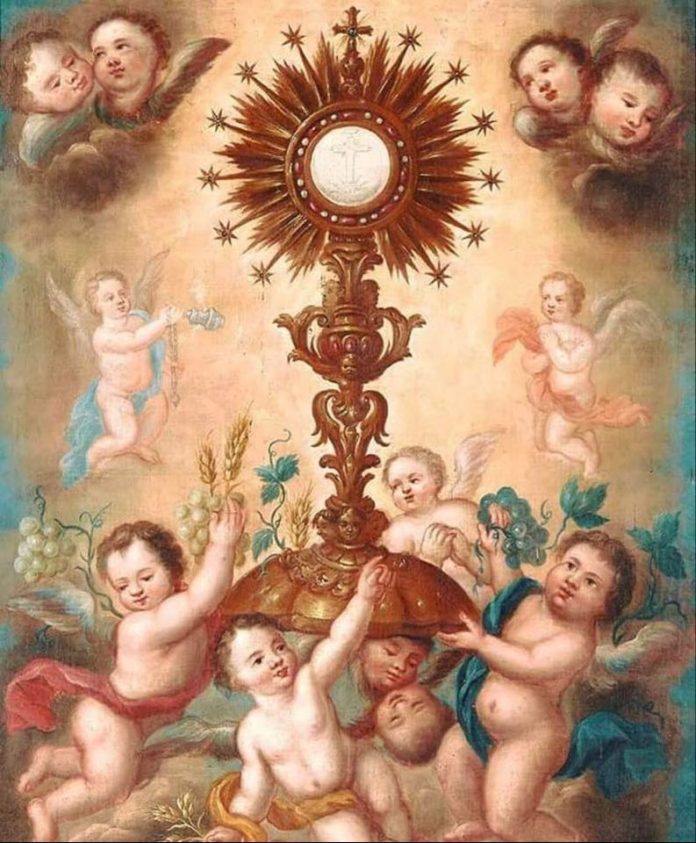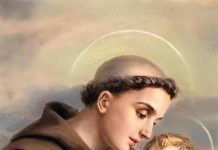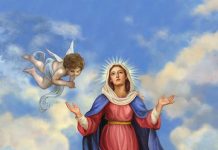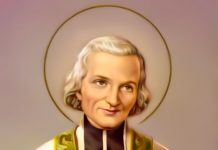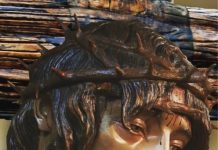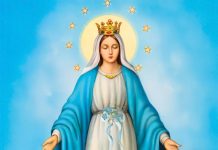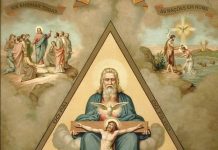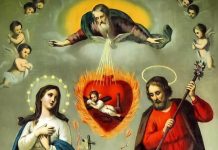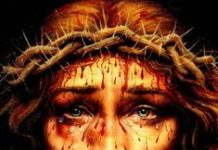“If we but paused for a moment to consider attentively what takes place in this Sacrament, I am sure that the thought of Christ’s love for us would transform the coldness of our hearts into a fire of love and gratitude.”
– St. Angela of Foligno
“Christ held Himself in His hands when He gave His Body to His disciples saying: ‘This is My Body.’ No one partakes of this Flesh before he has adored it.”
– St. Augustine
“Recognize in this bread what hung on the cross, and in this chalice what flowed from His side… whatever was in many and varied ways announced beforehand in the sacrifices of the Old Testament pertains to this one sacrifice which is revealed in the New Testament.”
– from the writings of St. Augustine, Sermon 3, 2; circa A.D. 410 {original translation}
“O Lord, we cannot go to the pool of Siloe to which you sent the blind man. But we have the chalice of Your Precious Blood, filled with life and light. The purer we are, the more we receive.”
– St. Ephraem
“When the bee has gathered the dew of heaven and the earth’s sweetest nectar from the flowers, it turns it into honey, then hastens to its hive. In the same way, the priest, having taken from the altar the Son of God (who is as the dew from heaven, and true son of Mary, flower of our humanity), gives him to you as delicious food.”
– St. Francis de Sales
“When you have received Him, stir up your heart to do Him homage; speak to Him about your spiritual life, gazing upon Him in your soul where He is present for your happiness; welcome Him as warmly as possible, and behave outwardly in such a way that your actions may give proof to all of His Presence.”
– St. Francis de Sales
“What wonderful majesty! What stupendous condescension! O sublime humility! That the Lord of the whole universe, God and the Son of God, should humble Himself like this under the form of a little bread, for our salvation”
“…In this world I cannot see the Most High Son of God with my own eyes, except for His Most Holy Body and Blood.”
– St. Francis of Assisi
AT THE FEET OF CHRIST IN THE EUCHARIST
From the writings of Saint Faustina
O Jesus, Divine Prisoner of Love, when I consider Your love and how You emptied Yourself for me, my senses deaden. You hide Your inconceivable majesty and lower Yourself to miserable me. O king of Glory, though You hide Your beauty, yet the eye of my soul rends the veil. I see the angelic choirs giving You honor without cease, and all the heavenly Powers praising You without cease, and without cease they are saying: Holy, Holy, Holy.
Oh, who will comprehend Your love and Your unfathomable mercy toward us! O Prisoner of Love, I love up my poor heart in this tabernacle that it may adore You without cease night and day. I know of no obstacle in this adoration: and even though I be physically distant, my heart is always with You. Nothing can put a stop to my love for You. No obstacles exist for me…
O Holy Trinity, One and Indivisible God, may You be blessed for this great gift and testament of mercy. Amen.
I adore You, Lord and Creator, hidden in the Most Blessed Sacrament. I adore You for all the works of Your hands, that reveal to me so much wisdom, goodness and mercy, O Lord. You have spread so much beauty over the earth and it tells me about Your beauty, even though these beautiful things are but a faint reflection of You, incomprehensible Beauty. And although You have hidden Yourself and concealed your beauty, my eye, enlightened by faith, reaches You and my souls recognizes its Creator, its Highest Good, and my heart is completely immersed in prayer of adoration.
My Lord and Creator, Your goodness encourages me to converse with You. Your mercy abolishes the chasm which separates the Creator from the creature. To converse with You, O Lord, is the delight of my heart. In You I find everything that my heart could desire. Here Your light illumines my mind, enabling it to know You more and more deeply. Here streams of grace flow down upon my heart. Here my soul draws eternal life. O my Lord and Creator, You alone, beyond all these gifts, give Your own self to me and unite Yourself intimately with Your miserable creature.
O Christ, let my greatest delight be to see You loved and Your praise and glory proclaimed, especially the honor of Your mercy. O Christ, let me glorify Your goodness and mercy to the last moment of my life, with every drop of my blood and every beat of my heart. Would that I be transformed into a hymn of adoration of You. When I find myself on my deathbed, may the last beat of my heart be a loving hymn glorifying Your unfathomable mercy. Amen.
“Do grant, oh my God, that when my lips approach Yours to kiss You, I may taste the gall that was given to You; when my shoulders lean against Yours, make me feel Your scourging; when my flesh is united with Yours, in the Holy Eucharist, make me feel Your passion; when my head comes near Yours, make me feel Your thorns; when my heart is close to Yours, make me feel Your spear.”
– St. Gemma Galgani
I hunger for the bread of God, the flesh of Jesus Christ …; I long to drink of his blood, the gift of unending love.
– St. Ignatius of Antioch
“Jesus taught a new sacrifice which the Church received from the Apostles and offers throughout the whole world.”
– St. Irenaeus (d. 202)
“If Christ did not want to dismiss the Jews without food in the desert for fear that they would collapse on the way, it was to teach us that it is dangerous to try to get to heaven without the Bread of Heaven.”
– St. Jerome
“How many of you say: I should like to see His face, His garments, His shoes. You do see Him, you touch Him, you eat Him. He gives Himself to you, not only that you may see Him, but also to be your food and nourishment.”
– St. John Chrysostom
“I throw myself at the foot of the Tabernacle like a dog at the foot of his Master.”
– St. John Vianney
“All the good works in the world are not equal to the Holy Sacrifice of the Mass because they are the works of men; but the Mass is the work of God. Martyrdom is nothing in comparison for it is but the sacrifice of man to God; but the Mass is the sacrifice of God for man.”
– St. John Vianney, Cure d’Ars
“Of the sacrifice which we offer in every place, that is, of the bread and chalice of the Eucharist, Malachias has prophesied.”
– St. Justin, 2nd Century Martyr
“God dwells in our midst, in the Blessed Sacrament of the altar.”
– St. Maximilian Kolbe
“He remains among us until the end of the world. He dwells on so many altars, though so often offended and profaned.”
– St. Maximilian Kolbe
“The culmination of the Mass is not the consecration, but Communion.”
– St. Maximilian Kolbe
“You come to me and unite Yourself intimately to me under the form of nourishment. Your Blood now runs in mine, Your Soul, Incarnate God, compenetrates mine, giving courage and support. What miracles! Who would have ever imagined such!”
– St. Maximilian Kolbe
“If angels could be jealous of men, they would be so for one reason: Holy Communion.”
– St. Maximilian Kolbe
“He is The Bread sown in the virgin, leavened in the Flesh, molded in His Passion, baked in the furnace of the Sepulchre, placed in the Churches, and set upon the Altars, which daily supplies Heavenly Food to the faithful.”
– St. Peter Chrysologus (400-450)
“Words cannot express the perfection of his adoration. If Saint John leaped in the womb at the approach of Mary, what feelings must have coursed through Joseph during those six months when he had at his side and under his very eyes the hidden God! If the father of Origen used to kiss his child during the night and adore the Holy Spirit living within Him, can we doubt that Joseph must often have adored Jesus hidden in the pure tabernacle of Mary? How fervent that adoration must have been: My Lord and my God, behold your servant! No one can describe the adoration of this noble soul. He saw nothing, yet he believed; his faith had to pierce the virginal veil of Mary. So likewise with you! Under the veil of the Sacred Species your faith must see our Lord. Ask St. Joseph for his Lively, constant faith.”
– St. Peter Julian Eymard
“At Nazareth Joseph’s days were filled with work which necessarily took him away at times from his Infant God. During these hours Mary replaced him, but when evening brought him home again, he would pass the entire night in adoration, never tiring, only too happy for the chance to contemplate the hidden riches of Jesus’ divinity. For he pierced the rough garments the Child wore, until his faith touched the Sacred Heart. In profound adoration he united himself to the special grace of each one of the events in the life of Jesus. He adored our Lord in His hidden life and in His Passion and Death; he adored in advance the Eucharistic Christ in His tabernacles: there was nothing that our Lord could hide from Saint Joseph. Among the graces which Jesus gave to His foster-father — and He flooded him with the graces attached to every one of His mysteries — is that special to an adorer of the Blessed Sacrament. That is the one we must ask of St. Joseph. Have confidence, strong confidence in him. Take him as the patron and the model of your life of adoration.”
– St. Peter Julian Eymard
“THOUGHT FROM FATHER FABER – St. Joseph worshiped Jesus as no saint before had done. From his deep, calm soul he poured out a very ocean of love – tenderest love, humblest love, love shrinking from being like the Father’s love, yet also daring to be like it as Mary’s had been like the conjoined loves of Father and of Spirit, as she was Mother and Spouse conjoined. No angel might love Jesus as Joseph loved Him, as Joseph was bound to love Him. No temporal love but Mary’s could be more like an eternal love than the love of Joseph for the Child, because of its likeness to the love of the everlasting Father. Aside from the Blessed Virgin, Saint Joseph was the first and most perfect adorer of Our Lord.”
– St. Peter Julian Eymard
“We have close to us as much as Joseph had at Nazareth; we have our Lord in the Blessed Sacrament, but our poor eyes fail to see Him. Let us once become interior souls and we shall immediately see. In no better way can we enter into the Heart of our Lord than through Saint Joseph. Jesus and Mary are eager to pay the debts which they owe him for his devoted care of them, and their greatest pleasure is to fulfill his least desire. Let him, then, lead you by hand into the interior sanctuary of Jesus Eucharistic.”
– St. Peter Julian Eymard
“We cannot help but marvel at the faith of Saint Joseph. Tormenting doubts harass his soul and he is on the point of leaving Mary. But an angel appears to him and all his doubts and fears vanish. On the angel’s word He accepts the mystery of the Incarnation. In the ensuing years his faith was to be frequently put to the test. At Bethlehem he had to content himself with a stable for a home where the Incarnate Word might be born. Soon after, he was forced to flee in order to save the Infant God, and when later he returned to the tiny village of Nazareth it was to live there unknown and in dire poverty. All these trials only tempered his faith. Although he sees only the Child’s wretchedness and poverty, his faith pierces the shroud and uncovers the hidden God within this weak baby frame. Because his faith was so strong, Joseph’s mind and heart bowed in perfect adoration. Imitate his faith as you kneel before the humble Christ annihilated in the Eucharist. Pierce the veil which covers this furnace of love and adore the hidden God. At the same time respect the veil of love and make the immolation of your mind and heart your most beautiful homage of faith.”
– St. Peter Julian Eymard
“Do you realize that Jesus is there in the tabernacle expressly for you – for you alone? He burns with the desire to come into your heart…don’t listen to the demon, laugh at him, and go without fear to receive the Jesus of peace and love…
“Receive Communion often, very often…there you have the sole remedy, if you want to be cured. Jesus has not put this attraction in your heart for nothing…”
“The guest of our soul knows our misery; He comes to find an empty tent within us – that is all He asks.”
– St. Therese of Lisieux
“How I loved the feasts!…. I especially loved the processions in honor of the Blessed Sacrament. What a joy it was for me to throw flowers beneath the feet of God!… I was never so happy as when I saw my roses touch the sacred Monstrance…”
– from St. Therese’s Autobiography: Story of A Soul
“By our little acts of charity practiced in the shade we convert souls far away, we help missionaries, we win for them abundant alms; and by that means build actual dwellings spiritual and material for our Eucharistic Lord.”
“It is not to remain in a golden ciborium that He comes down each day from Heaven, but to find another Heaven, the Heaven of our soul in which He takes delight.”
“You must open a little, or rather raise on high your corolla so that the Bread of Angels may come as divine dew to strengthen you, and to give you all that is wanting to you.”
– St. Therese of Lisieux, Doctor of the Church
“La sainteté c’est une disposition du coeur qui nous rend humbles et petits entre les bras de Dieu, conscients de notre faiblesse, et confiants jusqu’a l’audace en sa bonté de Pere.”
– Ste. Thérese de l’Enfant-Jésus
“Holiness is a disposition of the heart that makes us humble and little in the arms of God, aware of our weakness, and confident — in the most audacious way — in His Fatherly goodness.”
– St. Therese of the Infant Jesus
“The Blessed Sacrament is indeed the stimulus for us all, for me as it should be for you, to forsake all worldly ambitions. Without the constant presence of our Divine Master upon the altar in my poor chapels, I never could have persevered casting my lot with the lepers of Molokai; the foreseen consequence of which begins now to appear on my skin, and is felt throughout the body. Holy Communion being the daily bread of a priest, I feel myself happy, well pleased, and resigned in the rather exceptional circumstances in which it has pleased Divine Providence to put me.”
– Blessed Fr. Damien, Apostle of the Lepers
Words of Monsignor Jara to Blessed Teresa of the Andes First Communion Class at Mass before receiving Jesus for the first time:
“Ask Jesus Christ that, if you will ever commit a mortal sin, that He will take you today, since your souls are as pure as the snow on the mountains. Pray to Him for your parents, the authors of your existence. For those who have lost their parents, this is the moment to seek to be united with them. Yes, you are approaching to become witnesses of the intimate union of your souls with Jesus Christ. Look at the angels of the altar, dear little girls. Look at them, they envy you. All heaven is present.”
From Our Holy Father, Pope John Paul II’s World Youth Day homily on Sunday, August 24, 1997 in Paris, France:
“Rabbi, where are you staying?” Each day the Church responds: Christ is present in the Eucharist, in the sacrament of His death and resurrection. In and through the Eucharist, you acknowledge the dwelling-place of the Living God in human history. For the Eucharist is the Sacrament of the Love which conquers death. It is the Sacrament of the Covenant, pure Gift of Love for the reconciliation of all humanity. It is the gift of the Real Presence of Jesus The Redeemer, in the bread which is His Body given up for us, in the wine which is His Blood poured out for all. Thanks to the Eucharist, constantly renewed among all peoples of the world, Christ continues to build His church: He brings us together in praise and thanksgiving for salvation, in the communion which only infinite love can forge. Our worldwide gathering now takes on its fullest meaning, through the celebration of the Mass. Dear young friends, may your presence here mean a true commitment in faith! For Christ is now answering your own question and the questions of all those who seek the Living God. He answers by offering an invitation: This is My Body, take It and eat. To the Father He entrusts His supreme desire: that all those whom He loves may be one in the same communion.
THE EUCHARIST IS THE HEART OF THE CHURCH
This begins a series of excerpts from the English translation of the Homily given in Polish by the Our Holy Father, Pope John Paul II, at the close of the Eucharistic Congress in Wroclaw.
“Mystery of Faith!”
In order to examine in depth the mystery of the Eucharist, we must continually return to the Upper Room where in the evening of Holy Thursday the Last Supper took place. In today’s liturgy St. Paul speaks precisely of the institution of the Eucharist. This text seems to be the most ancient one concerning the Eucharist, preceding the account itself given by the Evangelists. In his Letter to the Corinthians Paul writes: “The Lord Jesus on the night when He was betrayed took bread, and when He had given thanks, he broke it, and said “This is My Body which is for you. Do this in remembrance of me.” In the same way also the cup, after supper, saying, “This cup is the new covenant in My Blood. Do this, as often as you drink of it, in remembrance of Me.” For as often as you eat this bread and drink this cup, you proclaim the Lord’s death until He comes.” (1 Cor 11:23-26)
THE EUCHARIST IS THE HEART OF THE CHURCH
(Excerpt from Our Holy Father, Pope John Paul II’s homily continued.)
“Christ has died. Christ is risen. Christ will come again in glory. These words contain the very essence of the Eucharistic mystery. In them we find what we bear witness to and share in every day as we celebrate and receive the Eucharist. In the Upper Room Jesus effects the consecration. By virtue of His words, the bread – while keeping the external appearance of bread – becomes His Body, and the wine – while maintaining the external appearance of wine – becomes His Blood. THIS IS THE GREAT MYSTERY OF FAITH! THIS IS THE LIVING BREAD WHICH CAME DOWN FROM HEAVEN!”
THE EUCHARIST IS THE HEART OF THE CHURCH
(Excerpt from Our Holy Father’s homily continued.)
“Celebrating this mystery, we not only renew what Christ did in the Upper Room, but we also enter into the mystery of His death! “We proclaim Your death!”- redeeming death. “Christ is risen!” We are sharers in the Sacred Triduum and the night of Easter. We are sharers in the saving mystery of Christ as we await His coming in glory. Through the institution of The Eucharist we have entered the end times, the time of awaiting Christ’s second and definitive coming, when the world will be judged and at the same time the work of redemption will be brought to completion. The Eucharist does not merely speak of all this. In The Eucharist – all this is celebrated – in It all this is fulfilled. Truly The Eucharist is the Great Sacrament of The Church. The Church celebrates The Eucharist, and at the same time The Eucharist makes the Church.”
THE EUCHARIST IS THE HEART OF THE CHURCH
(Excerpt from Our Holy Father, Pope John Paul II’s homily continued.)
“I Am the Living Bread” (Jn 6:51). The message of John’s Gospel completes the liturgical picture of this great Eucharistic mystery that we are celebrating today… The words of John’s Gospel are the great proclamation of The Eucharist, after the miraculous multiplication of bread near Capernaum. Anticipating as it were the time even before the Eucharist was instituted, Christ revealed what it was. He spoke thus: “I Am the Living Bread which came down from heaven; if anyone eats of this Bread, he will live forever; and the Bread which I shall give for the life of the world is My Flesh” (Jn 6:51). And when these words brought protests from many who were listening Jesus added: “Truly, truly I say to you, unless you eat the Flesh of the Son of man and drink His Blood, you have no life in you; he who eats My Flesh and drinks My Blood has eternal life, and I will raise him up at the last day. For My Flesh is food indeed, and My Blood is drink indeed. He who eats My Flesh and drinks My Blood abides in me, and I in him.” (Jn 6:53-56).
THE EUCHARIST IS THE HEART OF THE CHURCH
(Excerpt from Our Holy Father, Pope John Paul II’s homily continued.)
“These are words which concern the very essence of the Eucharist. Behold, Christ came into the world to bestow upon man divine life. He not only proclaimed the Good News but He also instituted the Eucharist which is to make present until the end of time His redeeming mystery. And as the means of expressing this He chose the elements of nature – the bread and wine, the food and drink that man must consume to maintain his life. The Eucharist is precisely this food and drink. This food contains in itself all the power of the Redemption wrought by Christ. In order to live man needs food and drink. In order to gain eternal life man needs the Eucharist. This is the food and drink that transforms man’s life and opens before him the way to eternal life. By consuming the Body and Blood of Christ, man bears within himself, already on this earth, the seed of eternal life, for the Eucharist is the sacrament of life in God. Christ says: “As the living Father sent me, and I live because of the Father, so he who eats me will live because of me.” (Jn 6:57).
THE EUCHARIST IS THE HEART OF THE CHURCH
(Conclusion of the excerpts from Our Holy Father, Pope John Paul II’s homily.)
“The eyes of all look to You, and You give them their food in due season (Ps 145.15) In the first reading of today’s liturgy Moses speaks to us of God who feeds His people on their journey through the wilderness to the Promised Land: “Remember all the way which the Lord your God has led you these forty years in the wilderness, that He might humble you, testing you to know what is in your heart… (He) fed you in the wilderness with manna which your fathers did not know, that He might humble you and test you, to do you good in the end.” (Dt. 8:2, 16) The image of a pilgrim people in the wilderness, which emerges from these words, speaks also to us who are approaching the end of the second millenium after Christ’s birth. In this image all the peoples and nations of the whole earth find a place, and especially those who suffer from hunger.” – L’Osservatore Romano, 4 June 1997
HOLY EASTER!!! THE LAMB WHO WAS SLAIN, IS THE LAMB WHO IS RISEN! JESUS IN THE MOST BLESSED SACRAMENT IS THE LAMB OF GOD!!! WORTHY IS THE LAMB! O COME LET US BEHOLD HIM WHO HAS WON FOR US SALVATION! O COME LET US ADORE HIM, FOR THE BREAD OF LIFE – JESUS EUCHARISTIC – IS REALLY AND PERSONALLY HERE!
MAY JESUS IN THE MOST BLESSED SACRAMENT, THE LAMB OF LOVE, BE WITH YOU AND BLESS YOU THIS EASTER AND ALWAYS! MAY OUR LADY OF THE MOST BLESSED SACRAMENT, MOTHER OF THE LAMB, LEAD YOU EVER CLOSER TO HIS EUCHARISTIC HEART!
“This is our Passover feast, when Christ, the true Lamb, is slain, whose blood consecrates the homes of all believers.” “Night truly blessed when heaven is wedded to earth and man is reconciled with God!”
“May the Morning Star which never sets find this flame still burning: Christ, the Morning Star, who came back from the dead, and shed His peaceful light on all mankind.”
– taken from the Exultet.
“The best way to economize time is to ‘lose’ half an hour each day attending Holy Mass.”
– Frederic Ozanam
It is there in His Eucharist that He says to me: “I thirst, thirst for your love, your sacrifices, your sufferings. I thirst for your happiness, for it was to save you that I came into the world, that I suffered and died on the Cross, and in order to console and strengthen you I left you the Eucharist. So you have there all My life, all My tenderness.”
– Mother Mary of Jesus, foundress of the Sisters of Marie Reparatrice
Father Lessius (1554-1623), the eminent Jesuit theologian, was afflicted with more than one painful disease. In spite of his sufferings, he would prolong his thanksgiving a full hour after Mass. To those who pitied him he would reply: “Why should I complain? Mine is still the joy of receiving the bread of angels.”
(From THE LINK)
The Bread of Heaven and the Cup of Salvation
On the night He was betrayed our Lord Jesus Christ took bread, and when He had given thanks, He broke it and gave it to His disciples and said: “Take, eat: this is My Body.” He took the cup, gave thanks and said: “Take, drink: this is My Blood.” Since Christ Himself has declared the bread to be His Body, who can have any further doubt? Since He Himself has said quite categorically, This is My Blood, who would dare to question it and say that it is not His Blood?
Therefore, it is with complete assurance that we receive the bread and wine as the Body and Blood of Christ. His Body is given to us under the symbol of bread, and His Blood is given to us under the symbol of wine, in order to make us by receiving them one body and blood in our members, we become bearers of Christ and sharers, as Saint Peter says, in the divine nature.
Once, when speaking to the Jews, Christ said: Unless you eat My Flesh and drink My Blood you shall have no life in you. This horrified them and they left Him. Not understanding His words in a spiritual way, they thought the Savior wished them to practice cannibalism.
Under the old covenant there was showbread, but it came to an end with the old dispensation to which it belonged. Under the new covenant there is Bread from Heaven and the Cup of Salvation. These sanctify both soul and body, the bread being adapted to the sanctification of the body, the Word, to the sanctification of the soul.
Do not, then, regard the Eucharistic elements as ordinary bread and wine: they are in fact the Body and Blood of The Lord, as He Himself has declared. Whatever your senses may tell you, be strong in faith.
You have been taught and you are firmly convinced that what looks and tastes like bread and wine is not bread and wine but the Body and Blood of Christ. You know also how David referred to this long ago when he sang: Bread gives strength to man’s heart and makes his face shine with the oil of gladness. Strengthen your heart, then, by receiving this bread as spiritual bread, and bring joy to the face of your soul.
May purity of conscience remove the veil from the face of your soul so that by contemplating the glory of the Lord, as in a mirror, you may be transformed from glory to glory in Christ Jesus our Lord. To Him be glory forever and ever. Amen.
– from the Jerusalem Catecheses
(Cat. 22, Mystagogica 4, 1. 3-6. 9: PG 33, 1098-1106)
“Consider the generosity of our Savior: what He acquired by dying becomes ours by eating. As often as we receive this Sacrament with proper dispositions, we make our own the fruits of all the labors, injuries and sufferings of His life, especially those borne at the time of His passion and death. Just as the power and the sensations of the head reach all the members of the body, in the same way, because Christ is “the head of the Church which is His Body” (Eph. 1:23), the treasures of His grace are made abundantly available to all who through charity are one with Him as living members.”
– Louis of Grenada (1554-1623)


